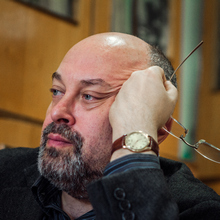Tell us about yourself: where you come from, what you teach at Ca 'Foscari, what are your interests and your research areas.
I was born in Odessa, Ukraine, so before I joined the Department of Linguistic and Comparative Cultural at Ca’ Foscari in September 2021 I worked in the Soviet Union (Odessa State University, Moscow State University, the Russian State University for the Humanities, Moscow), in the USA (Duke University, Stanford University, Amherst College, University of California), and in the UK at the University of Nottingham and University of Sheffield where I was a Head of Department of Russian and Slavonic Studies. I held a Stanford Humanities Centre Fellowship, a Karl Loewenstein Fellowship in Political Science at Amherst College, and a Kennan Institute of the Woodrow Wilson International Centre Fellowship. I was a Fellow at the New York University International Centre for Advanced Studies and at the Centre for Research in the Arts, Social Sciences and Humanities at the University of Cambridge. I have also been a recipient of the Guggenheim Fellowship, the Leverhulme Major Research Fellowship, an AHRC Grant, EURIAS Senior Fellowship at the Institut für die Wissenschaften vom Menschen in Vienna, the Fernand Braudel Fellowship at the European University Institute in Florence and the Senior Research Fellowship at the University of Hokkaido. I have taught academic seminars and delivered public lectures in Germany, Austria, France, Italy, Holland, Belgium, Switzerland, Bulgaria, Lithuania, Russia, China, Japan, Korea, the UK, and across the United States. In 2012 I was awarded the Efim Etkind Prize for the best book about Russian Culture and in 2019 I received AATSEEL Award for Outstanding Contributions to Scholarship. My research interests lie in Soviet and post-Soviet literature and culture, Stalinism, Socialist Realism, Soviet national literatures, Russian and Soviet film, critical theory and Soviet cultural history. I am the author, editor and co-editor of twenty-five books, and more than 250 articles and essays, which have been translated into ten languages.
Did you always think this was your way?
Having spent my whole life in academia – universities, and academic institutions, – I never imagined any other way of life. Writing books and teaching students is the only thing I love and do best. I consider myself very fortunate that my job and is my hobby. I consider it a tremendous fortune to have had a life filled with work I love. Moreover, I have been involved with one topic all my life – Stalinist culture. I began to work on it when very few people were interested in it. Majority of my colleagues were interested in other aspects of the history of Russian literature and culture. It is always interesting to deal with a topic that does not seem mainstream, but turns out to be one, because Stalinism was and remains the nerve center of Russian history.
What does it say to young people who are starting their university career?
It seems to me that young people, for whom to be a university student is a great personal achievement, do not always realize that university is not the goal in itself or the end of the road, but only the beginning. So is education. It is not an end, but a means to achieve life's goals. A proper understanding of the objectives of a university education allows a young person to get the most important thing from university – the choice of a profession with which a person will spend most of his or her life. The wrong specialization can make a person miserable for life. On the contrary, the right choice of profession can make a person happy for life. It is a very important choice. Therefore, you should look at university as a place where a young person learns not only science, but also him- or herself, opens himself to himself, better understands what he or she wants in life.
Why Ca 'Foscari and Venice?
Venice is perceived by many as a museum city, a monument, but for me Venice is something much bigger than that – a metaphor for a globalized world. It is a city at the crossroads of civilizations, a window to the big world, a gateway to world trade and communications. If you read the city this way, it is not about the past (or rather, not only about the past), but rather about the future. It is an open city – a symbol of an open society. Therefore, it is an ideal place for cultural exchange, for learning the world's languages and cultures.
What knowledge and skills should the university transmit?
The main thing that the university should pass on to young people is an interest in acquiring knowledge, flexibility, the ability to learn, because today's world is much more complex, diverse and rapidly changing than it was before, and to keep up with it means to keep up with new technology, information, learning new skills and adapting.

